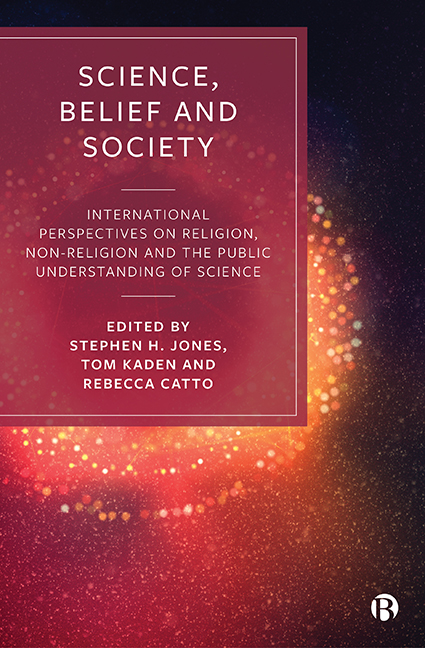 Science, Belief and Society
Science, Belief and Society Book contents
- Frontmatter
- Contents
- List of Figures and Tables
- Notes on Contributors
- Editors’ Acknowledgement
- Foreword
- Editors’ Introduction: Science, Belief and the Sociological Tradition
- PART I Methodological Challenges in the Study of Science and Belief
- PART II Belief in the Study of Science and Technology
- PART III Science, Culture and Non-religion
- PART IV Religion, Conflict and Moderation
- Conclusion: Future Directions in the Sociological Study of Science and Belief
- Index
Conclusion: Future Directions in the Sociological Study of Science and Belief
Published online by Cambridge University Press: 27 April 2022
- Frontmatter
- Contents
- List of Figures and Tables
- Notes on Contributors
- Editors’ Acknowledgement
- Foreword
- Editors’ Introduction: Science, Belief and the Sociological Tradition
- PART I Methodological Challenges in the Study of Science and Belief
- PART II Belief in the Study of Science and Technology
- PART III Science, Culture and Non-religion
- PART IV Religion, Conflict and Moderation
- Conclusion: Future Directions in the Sociological Study of Science and Belief
- Index
Summary
One thing that this volume has made clear is that religious and other forms of ultimate belief interact with science in myriad ways, many of which are hardly recognized amid a public debate fixated on the simplistic categories of ‘acceptance’ and ‘rejection’ or ‘conflict’ and ‘compatibility’. For different religious and non-religious communities of belief, ‘science’ can function as a cause to be fought for, a means of bolstering the appeal and authority of a revivalist movement, a means of making subtle cultural or class distinctions, or an imagined adversary to be challenged or competed with.
Among this volume's central aims has been to broaden the horizons of the study of science and belief, expanding upon the recent, innovative, US-based sociological research and moving the focus to states such as India, Pakistan, Turkey, Sweden, Canada and the UK. The further one moves afield, the more complex the subject becomes: it is clear that there is a whole world of difference between, say, the Midwestern US educational settings discussed by David Long in Chapter 11 and the elite contexts in Renny Thomas's study of Indian scientists in Chapter 6. Recent US-focused research has stridently moved away from the conflict thesis in the last decade, undermining the idea that public conflicts between conservative Protestants and secularist or scientific organizations are driven by knowledge differences. However, focusing the empirical lens on a country such as India – where it is unremarkable or even expected for elite scientists to see their findings and justify their work in religious terms – reveals this thesis to be provincial as much as it is simplistic.
Another aim has been to bridge the divides between the sociology of science, the sociology of religion and the emerging sociology of non‑religion. All of these fields share an interest in questions of knowledge, belief and how these inform particular normative positions, and we remain convinced that there is a great deal that can be learnt from building firmer connections. There is, though, only so much that can be done to shape research agendas in one collection. In this conclusion, therefore, we want to not only consider themes emerging across the chapters, but also discuss some of the volume's limitations and use the insights found across it to make proposals for future work.
- Type
- Chapter
- Information
- Science, Belief and SocietyInternational Perspectives on Religion, Non-Religion and the Public Understanding of Science, pp. 289 - 298Publisher: Bristol University PressPrint publication year: 2019
- 1
- Cited by


